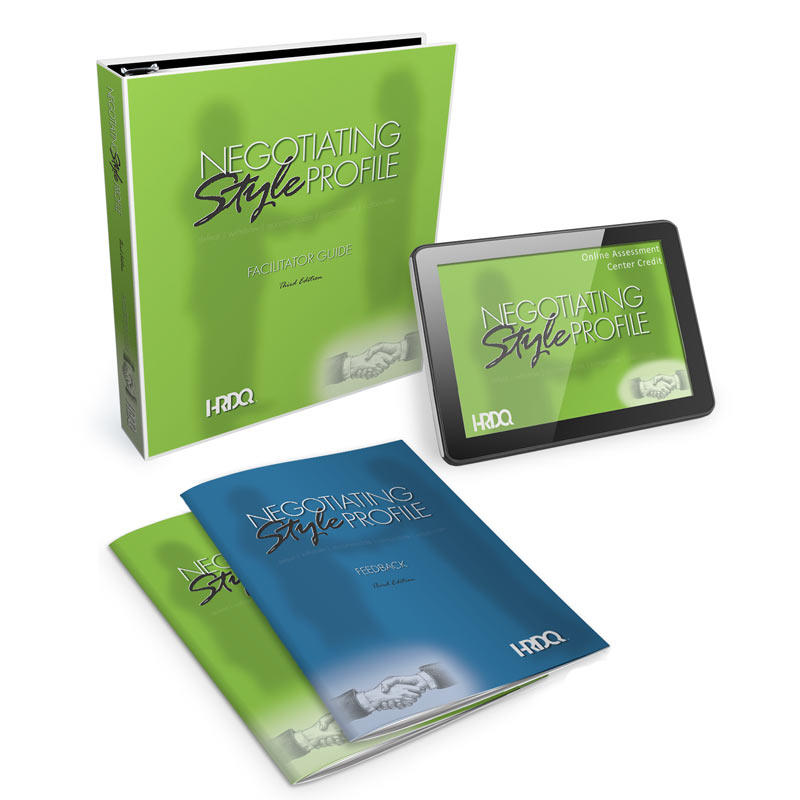NEGOTIATING STYLE PROFILE
3rd Edition, by Rollin Glaser, EdD and Christine Glaser, MEd
Available in both Online and Paper-Based Format
The goal isn't to crush the opponent.
Everybody negotiates. And whether people are striving to hit their monthly sales quota, campaigning for a deadline extension, or pitching ideas to a team, the same principles apply. There's more to effective negotiating than the outcome alone. In fact, building productive relationships is equally important. Skillful negotiators know this is the key to their success - and it's what sets them apart from the rest.
As a trainer, you can help individuals to develop their collaborative negotiating skills through thought, preparation, and skill practice. Based on Ury and Fisher's collaborative win-win model, and heavily influenced by the highly-respected Thomas-Kilmann conflict resolution model, the Negotiating Style Profile offers a simple framework for determining one's negotiating style and the likely effect it has in negotiating situations.
A powerful combination of self-assessment, 180° peer feedback, and classroom training, the Negotiating Style Profile identifies a preference for one of five negotiating styles: Defeating, Accommodating, Collaborating, Withdrawing, or Compromising.
Learning Outcomes
- Learn five styles of negotiating
- Identify personal negotiating style
- Discover why a win-win approach is most effective
- Learn how one's negotiating style is perceived by others
- Develop an action plan to improve negotiating-style strengths
The Negotiating Style Profile has been a trainer favorite for more than 30 years. It's an excellent starting point for anyone in your organization, from front-line employees to management team members and everyone in between.
The Negotiating Style Profile self-assessment presents individuals with 30 statements. Their task is to choose one of seven possible responses, ranging from Completely Characteristic to Completely Uncharacteristic. Scores reveal a preference for one of five negotiating styles: Defeating, Accommodating, Collaborating, Withdrawing, or Compromising.
The Negotiating Style Profile also offers a 180° feedback component that enables individuals to see how they are perceived by their peers. Combining the results of the self-assessment and the feedback provides individuals with an in-depth understanding of their natural tendencies as well as a starting point for improvement. Both pieces take approximately 20 minutes to complete, and we recommend you allow approximately one hour for the interpretation of results, debrief, and goal setting.
The Negotiating Style Profile Facilitator Set includes tools to lead a 1 ½-hour classroom training workshop, including comprehensive background information, step-by-step instructions, optional activities, alternative training options, a reproducible article, and a professional Microsoft® PowerPoint® presentation. Trainer certification is not required to administer or facilitate the Negotiating Style Profile.
Uses and Applications
The Negotiating Style Profile can be used as a stand-alone learning instrument or part of a more comprehensive curriculum on topics such as negotiating, selling, communication, and conflict resolution. It's an excellent starting point to help individuals:
- Gain awareness of their current negotiating behavior.
- Prepare for an upcoming negotiation.
- Improve the planning and communication skills needed to be an effective negotiator.
- Practice negotiating with people who have different negotiating styles.
- Improve reasoning skills.
The Negotiating Style Profile is suitable for all individuals, especially supervisors, customer service representatives, managers, sales professionals, negotiators, and consultants.
Target Audience: All individuals, especially those who negotiate on a regular basis
Product Type: Self-assessment and classroom workshop
Measures: Personal negotiating preferences
Dimensions
Defeating, Accommodating, Collaborating, Withdrawing, Compromising
Time Required
Administration: 20 minutes
Interpretation: 1 hour
Workshop: 1.5 hours